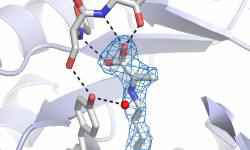Structural Bioinformatics and Structural Molecular Biology
Structural bioinformatics is the branch of bioinformatics which is related to the analysis and prediction of the three-dimensional structure of biological macromolecules such as proteins, RNA, and DNA. It deals with generalizations about macromolecular 3D structure such as comparisons of overall folds and local motifs, principles of molecular folding, evolution, and binding interactions, and structure/function relationships, working both from experimentally solved structures and from computational models. The term structural has the same meaning as in structural biology, and structural bioinformatics can be seen as a part of computational structural biology. Structural biology is a branch of molecular biology, biochemistry, and biophysics concerned with the molecular structure of biological macromolecules, especially amino and nucleic acids, how they acquire the structures they have, and how alterations in their structures affect their function.
- Algorithms
- Software
- Databases
- Tools
- Protein behavior
- Macromolecular interaction
- Chemical Biology
- Protein function
Related Conference of Structural Bioinformatics and Structural Molecular Biology
Structural Bioinformatics and Structural Molecular Biology Conference Speakers
Recommended Sessions
- Animal and Plant Biochemistry
- Cardiac Biochemistry
- Cellular and Molecular Biology
- Clinical and Nutritional Biochemistry
- Clinical Pathology
- Computational Chemistry and Chemical Biology
- Enzymology & Biochemistry
- Enzymology in Molecular Biology
- Lipids and Metabolism
- Medical Genetics
- Medicinal and Pharmaceutical Biochemistry
- Nano Biochemistry
- Protein and Analytical Biochemistry
- Proteomics in Biochemistry and Molecular Biology
- Structural and Molecular Biochemistry
- Structural Bioinformatics and Structural Molecular Biology
- Structural Biology
- Toxicology and Pharmacology
Related Journals
Are you interested in
- 3D Structure Determination - Structural Biology-2026 (France)
- Advanced Techniques in Structural Biology - Structural Biology-2026 (France)
- AI & Computational Structural Biology - Structural Biology-2026 (France)
- Biochemistry and Biophysics - Structural Biology-2026 (France)
- Computational Approach in Structural Biology - Structural Biology-2026 (France)
- Drug Designing and Biomarkers - Structural Biology-2026 (France)
- Hybrid Approaches for Structure Prediction - Structural Biology-2026 (France)
- Membrane Proteins and Receptors - Structural Biology-2026 (France)
- Molecular Modelling and Dynamics - Structural Biology-2026 (France)
- Proteomics and Genomics - Structural Biology-2026 (France)
- Structural Bioinformatics and Computational Biology - Structural Biology-2026 (France)
- Structural Biology in Cancer Research - Structural Biology-2026 (France)
- Structural Virology - Structural Biology-2026 (France)
- Structural Virology and Infectious Diseases - Structural Biology-2026 (France)
- Structure-Based Drug Discovery - Structural Biology-2026 (France)
- Structure-Based Solutions to Global Health Challenges - Structural Biology-2026 (France)
- Structure-Function Relationships - Structural Biology-2026 (France)
- The Structural Basis of Disease - Structural Biology-2026 (France)


